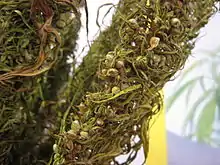Edestin
Edestin, (also known as Edistin[1]) is a highly-digestible, hexameric legumin protein with six subunits, [2][3][4] and a seed storage protein,[5] with a molecular weight of 310 kDa.[6] This protein is primarily found in hemp seeds.[2] Edestin is a globular protein (biologically active) as opposed to fibrous protein (structural).
Globular proteins found in edestin (and in Alpha 1 globulins, Alpha 2 globulins, Beta globulins, and Gamma globulins) are long peptide chains, precursors for biological proteins essential for life. Edestin is similar to serum globulin (blood plasma), and the biologically active protein of edestin is metabolized in the human body and capable of biosynthesizing:[7][8]
- hormones (which regulate all the body processes),
- hemoglobin (which transports oxygen, carbon dioxide, and nitric oxide),
- enzymes (which catalyze and control biochemical reactions),
- antibodies (immunoglobulins which fend off invading bacteria, viruses, and other pathogens, as well as toxins or antigens as they enter the body).
Edestin can also be broken down to edestan.[9]
Hemp seed

It has been discovered that there are seven cDNAs encoding edestin in Cannabis sativa L., the sequences are distinguished by globulin characteristic. There is a type 1 and type 2 of edestin that are both used in process of the development of hemp seeds. Edestin has been used to help the nutritional quality of plant consumption.[10] Hemp seeds are considered to be fruits from hemp plants,[11] and can be used in several different methods: medicine, food, fiber, or psychoactive adjuvants.[12]
Commercial hemp seeds (for human consumption) contain an average 30-35% protein, of which 60-80% is edestin (the remainder being albumin).[13] A particular strain of Korean hemp, Cheungsam, because it contains 2,2-diphenyl-1-picrylhydrazyl (DPPH) free radical scavenging activity, has been suggested for utilization as "a superior antioxidative nutrient".[7]
References
- Möller G, Fernandez C (1978). "Immunological tolerance to the thymus-independent antigen dextran can be abrogated by thymus-dependent dextran conjugates: evidence against clonal deletion as the mechanism of tolerance induction". Scandinavian Journal of Immunology. 8 (1): 29–37. doi:10.1111/j.1365-3083.1978.tb00493.x. PMID 309173. S2CID 40616995.
- Patel, Samit; Cudney, Robert; McPherson, Alexander (1994-01-07). "Crystallographic characterization and molecular symmetry of edestin, a legumin from hemp". Journal of Molecular Biology. 235 (1): 361–363. doi:10.1016/S0022-2836(05)80040-3. ISSN 0022-2836. PMID 8289257. S2CID 30690679.
- Patel S, Cudney R, McPherson A (January 1994). "Crystallographic characterization and molecular symmetry of edestin, a legumin from hemp". J. Mol. Biol. 235 (1): 361–3. doi:10.1016/S0022-2836(05)80040-3. PMID 8289257. S2CID 30690679.
- Chuan-He Tang (November 15, 2006). "Physicochemical and functional properties of hemp (Cannabis sativa L.) protein isolate". J Agric Food Chem. 54 (23): 8945–8950. doi:10.1021/jf0619176. PMID 17090145.
- Teresa Docimo (September 24, 2014). "Molecular characterization of edestin gene family in Cannabis sativa L". Plant Physiology and Biochemistry. 84: 142–148. doi:10.1016/j.plaphy.2014.09.011. PMID 25280223.
- "Protein - Proteins of the blood serum | Britannica".
- Kim, Jum-Ji (2011), "Isolation and Characterization of Edestin from Cheungsam Hempseed", Journal of Applied Biological Chemistry, 54 (2): 84–88, doi:10.3839/jabc.2011.015
- Tombs MP (1960). "A haemoglobin-binding beta-globulin in human serum". Nature. 186 (4730): 1055–6. Bibcode:1960Natur.186.1055T. doi:10.1038/1861055b0. PMID 13838734. S2CID 4213851.
- Kenneth Bailey (January 29, 1942). "The denaturation of edestin by acid: T. B. Osborne's edestan". Biochemical Journal. 36 (1–2): 140–154. doi:10.1042/bj0360140. PMC 1265671. PMID 16747476.
- Docimo, Teresa; Caruso, Immacolata; Ponzoni, Elena; Mattana, Monica; Galasso, Incoronata (2014-11-01). "Molecular characterization of edestin gene family in Cannabis sativa L." Plant Physiology and Biochemistry. 84: 142–148. doi:10.1016/j.plaphy.2014.09.011. ISSN 0981-9428. PMID 25280223.
- Bhandwale, Guruprasad; Pujari, Sourabh; Kadam, Pradnya; Mantri, Shivani; Kulkarni, Poorva. "Evolutionary study of Edestin Protein in Cannabis Sativa L" (PDF). www.irjet.net.
- Docimo, Teresa; Caruso, Immacolata; Ponzoni, Elena; Mattana, Monica; Galasso, Incoronata (2014-11-01). "Molecular characterization of edestin gene family in Cannabis sativa L." Plant Physiology and Biochemistry. 84: 142–148. doi:10.1016/j.plaphy.2014.09.011. ISSN 0981-9428. PMID 25280223.
- Galasso, Incoronata (2016), "Variability in Seed Traits in a Collection of Cannabis sativa L. Genotypes", Frontiers in Plant Science, 7: 688, doi:10.3389/fpls.2016.00688, PMC 4873519, PMID 27242881